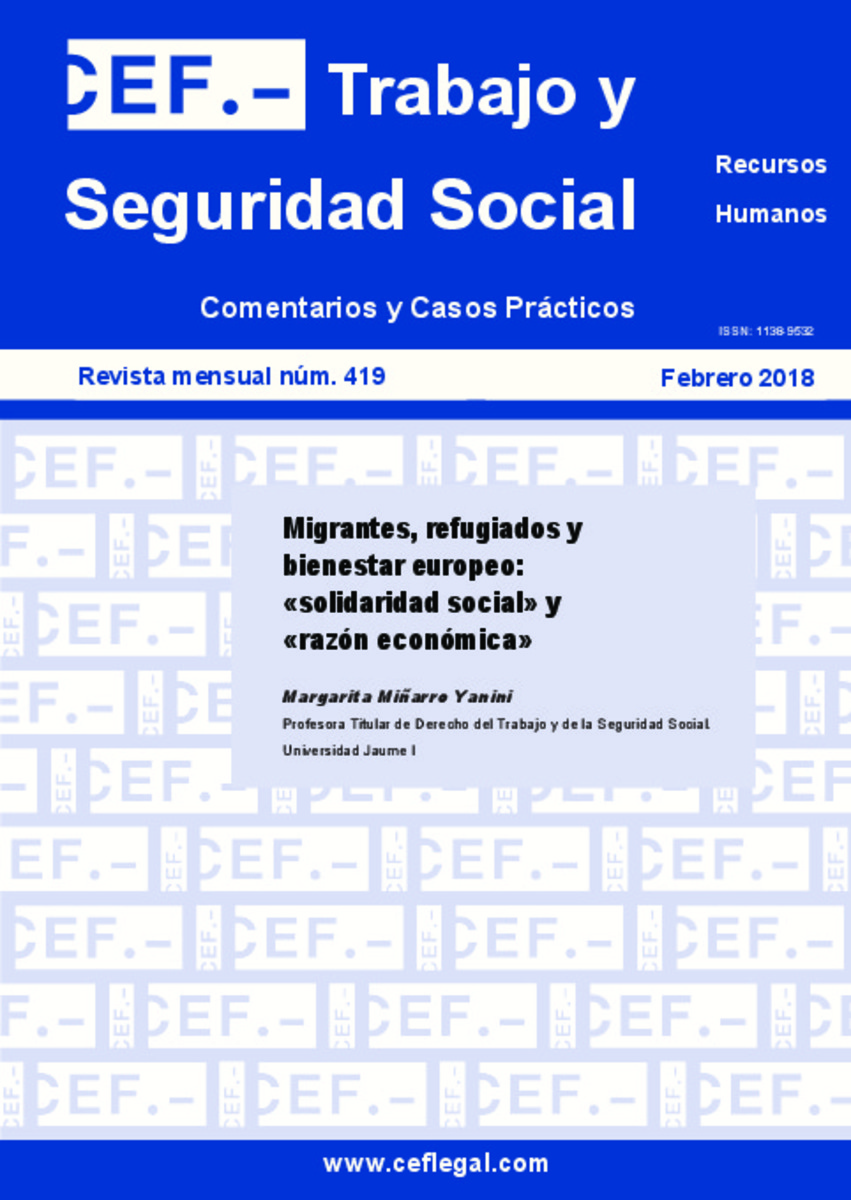Mostrar el registro sencillo del ítem
Migrantes, refugiados y bienestar europeo: "solidaridad social" y "razón económica"
| dc.contributor.author | Miñarro Yanini, Margarita | |
| dc.date.accessioned | 2018-06-11T09:45:54Z | |
| dc.date.available | 2018-06-11T09:45:54Z | |
| dc.date.issued | 2018-02 | |
| dc.identifier.citation | MIÑARRO YANINI, Margarita. (2018). Migrantes, refugiados y bienestar europeo: "solidaridad social" y "razón económica". Estudios Financieros. Revista de Trabajo y Seguridad Social, n. 419, p. 5-15 | ca_CA |
| dc.identifier.uri | http://hdl.handle.net/10234/175083 | |
| dc.description.abstract | El año 2017 se despedía con un dato sociodemográfico inquietante relativo a nuestro «saldo vegetativo» –diferencia entre defunciones y nacimientos–, y es que en España hay más defunciones que nacimientos, lo que no es un mero dato coyuntural sino una tendencia, al repetirse cada semestre desde 2015 (Informe INE sobre el Movimiento Natural de la Población). No obstante, el balance final de la radiografía sociodemográfica española resulta muy esperanzador porque gracias al «saldo migratorio» positivo se logró que la población residente en España –por lo tanto, activa, cotizante y contributiva– no solo se mantuviese respecto del año anterior, sino que aumentara hasta superar los 46,5 millones de habitantes, consolidando así el crecimiento iniciado en 2016. Dicho «saldo migratorio» favorable se produjo porque entraron en España 237.115 inmigrantes y salieron más de 184.189 ciudadanos –nacionales y extranjeros–, lo que arroja una diferencia positiva de 52.926 personas. | ca_CA |
| dc.description.abstract | 2017 ended with worrying socio-demographic data regarding Spain’s rate of natural increase (crude birth rate minus crude death rate). The fact that there were more deaths than births in the country is not temporary but a tendency taking place every quarter since 2015 according to the Natural Population Movement Report by the Spanish National Statistical Institute. Yet, the overall balance in the country might prove to be hopeful, since its positive migratory balance allowed the population living in Spain (active contributors) to increase beyond 46.5 million inhabitants, consolidating an increase that started in 2016. The positive migratory balance (52,926 persons) was due to the difference between the 237,115 immigrants the country had as opposed to the 184,189 citizens (nationals and foreigners) that fled the country. | |
| dc.format.extent | 15 p. | ca_CA |
| dc.format.mimetype | application/pdf | ca_CA |
| dc.language.iso | spa | ca_CA |
| dc.publisher | Centro de Estudios Financieros | ca_CA |
| dc.relation.isPartOf | Estudis Financieros: Revista de Trabajo y Seguridad Social (2018), n. 419, | ca_CA |
| dc.rights.uri | http://rightsstatements.org/vocab/CNE/1.0/ | * |
| dc.subject | Spain | ca_CA |
| dc.subject | Demography | ca_CA |
| dc.subject | Vegetative growth | ca_CA |
| dc.subject | Migration balance | ca_CA |
| dc.subject | España | ca_CA |
| dc.subject | Demografía | ca_CA |
| dc.subject | Crecimiento vegetativo | ca_CA |
| dc.subject | Saldo migratorio | ca_CA |
| dc.title | Migrantes, refugiados y bienestar europeo: "solidaridad social" y "razón económica" | ca_CA |
| dc.type | info:eu-repo/semantics/article | ca_CA |
| dc.rights.accessRights | info:eu-repo/semantics/openAccess | ca_CA |
| dc.relation.publisherVersion | https://www.laboral-social.com/editorial-migrantes-refugiados-bienestar-europeo-solidaridad-social-razon-economica.html | ca_CA |
| dc.type.version | info:eu-repo/semantics/publishedVersion | ca_CA |
Ficheros en el ítem
Este ítem aparece en la(s) siguiente(s) colección(ones)
-
DTR_Articles [240]







